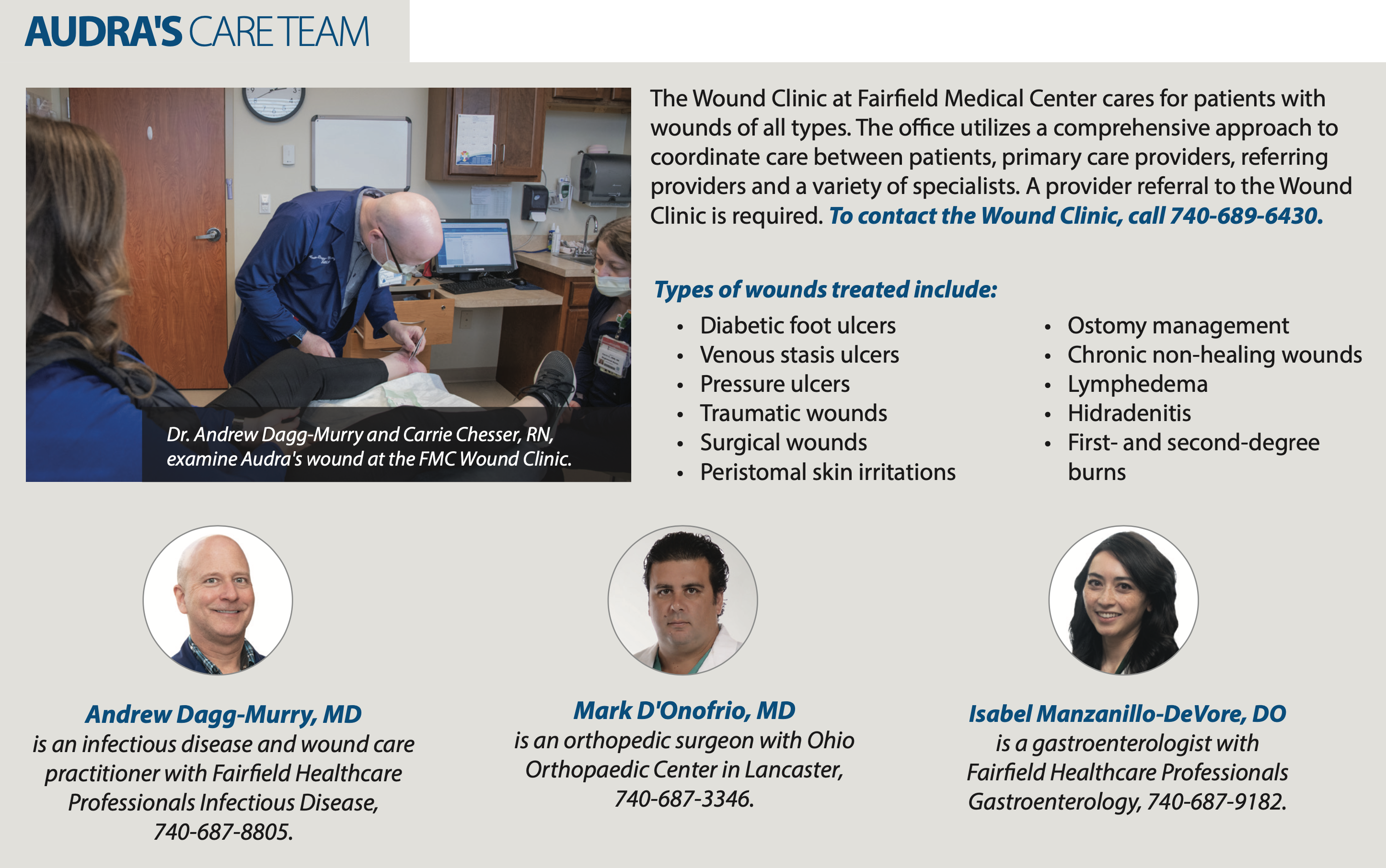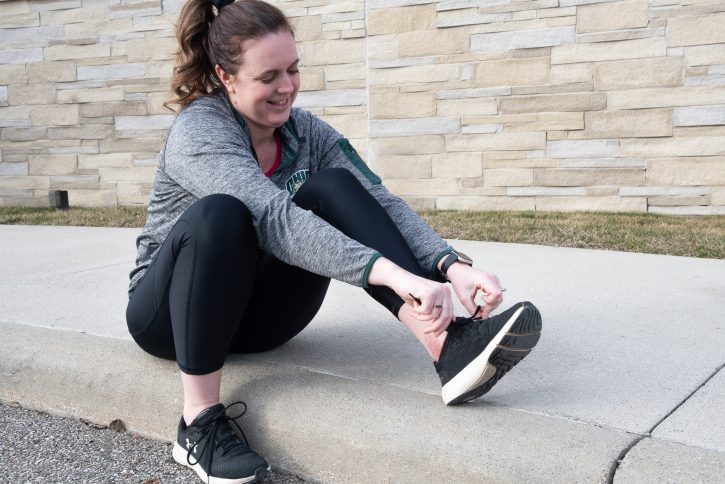
Article originally published Spring 2023 in The Monitor magazine.
As 2022 drew to a close, Audra Harden had two last-minute goals that she was determined to cross off her list before heading into the new year. The first was to be able to stand and sing with the choir at Fairfield Medical Center’s employee Christmas party on Dec. 9. The second was to dance – even just for a few minutes – with her husband, Wes Harden, at his annual military ball.
To some, these goals might sound simple. But last summer, the chance of Audra never being able to dance or even walk again was a very real possibility after she developed a mysterious and painful wound on her ankle. Audra initially sought care at healthcare facilities near her home and was misdiagnosed several times before her search for answers led her to Fairfield Medical Center, where she works as a recruitment specialist.
“I think my determination to stay positive during all of this was largely due to the people who were around me and who cared for me – my nurses, my physicians, everybody,” said Audra, 32, of Malta. “There is an incredible amount of talent here at FMC. Without them, there is no question I would have lost my foot.”
“Once I went off the steroid, the swelling came back with a vengeance,” Audra said. “It got to where I couldn’t walk at all. My ankle was painful and warm to the touch.”
Audra sought medical attention again, this time at an emergency department near her home. Suspecting that the cause might be a blood clot, the staff did a series of scans before sending Audra home with another prescription and a recommendation to call her primary care physician. Frustrated at the lack of answers, Audra spent the weekend propped up in an armchair, where she began doing her own research. She discovered that ulcerative colitis, a chronic gastrointestinal condition she had been diagnosed with several years prior, can contribute to joint pain (see box). Wondering if that might be the cause of the swelling, she picked up the phone and scheduled an appointment with Isabel Manzanillo-DeVore, DO, of Fairfield Healthcare Professionals Gastroenterology.
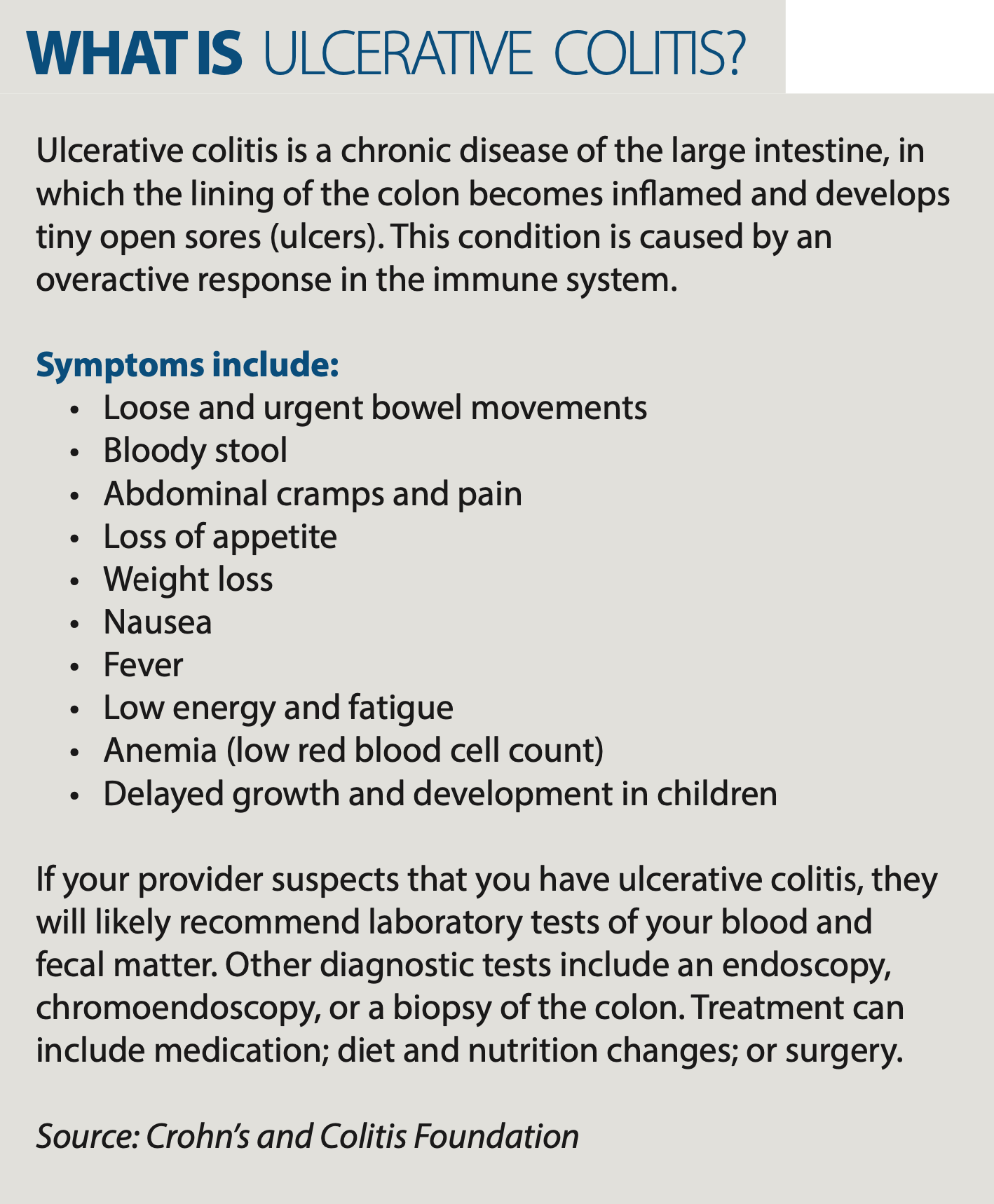
Concerned about the state of Audra’s ankle, Dr. Manzanillo- DeVore referred Audra to FMC’s emergency department for further diagnostics. After undergoing a series of scans, Audra was admitted to the hospital’s orthopedic unit for observation. She fell asleep fine that first night, but when she woke up the next morning, her condition had rapidly deteriorated.
“I was in excruciating pain; I had probably gone from a six to a 10 overnight in terms of pain level, and it was all localized right there in my ankle,” Audra said. “It was starting to turn purple, and it had swelled up so much, you couldn’t even see it anymore.”
During the first few days of Audra’s stay, she underwent two surgeries with orthopedic surgeon Mark D’Onofrio, MD, of Ohio Orthopaedic Center, to drain the large ulcer that was starting to develop on her ankle. Despite those efforts, the ulcer refused
to heal and began to worsen. She was also continuing to battle severe pain. Audra recalls how the nurses in the orthopedic unit, particularly Lisa Scott, RN, went above and beyond to help keep her as comfortable as possible post-surgery.
“They had to put me on oxygen because I was in so much pain, I kept losing my breath,” Audra said. “The way that Lisa cared for me is something I will never forget. She was just phenomenal. She’s like my angel.”
With the surgical drains proving to be ineffective, Audra’s perplexing case was brought to the attention of FMC infectious disease practitioner Andrew Dagg-Murry, MD. Upon examining Audra’s ankle, Dr. Dagg-Murry started to suspect that the ulcer was the result of a rare condition called pyoderma gangrenosum.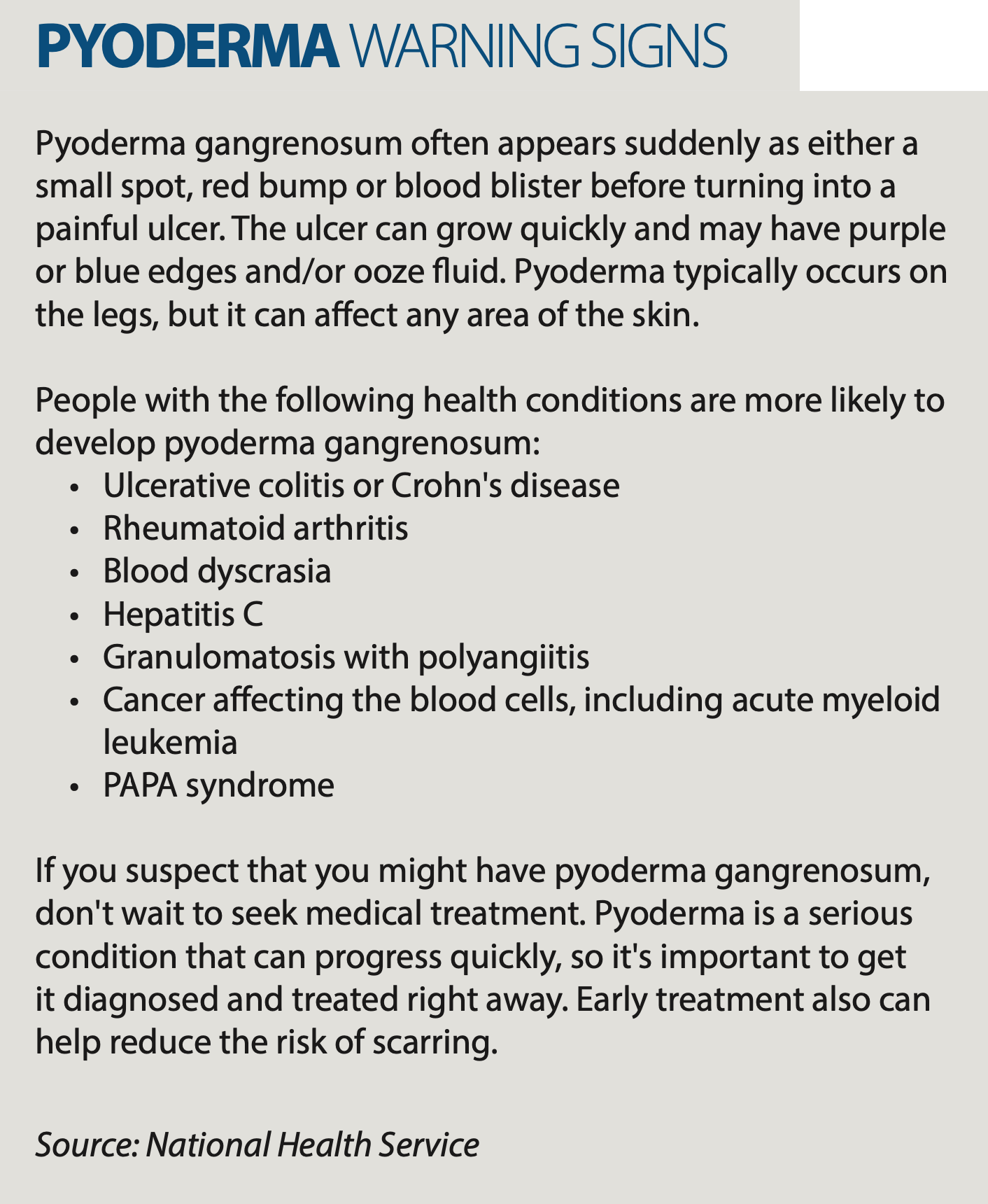
“It can be a difficult diagnosis to make, but when I saw how bad the condition of her foot was after the procedure, and how rapidly the other side of her ankle was developing a similar picture, I had a pretty strong suspicion that’s what we were dealing with,” he said.
Dr. Dagg-Murry said he typically only sees about five cases of pyoderma gangrenosum every year. The disease is associated with many autoimmune disorders, such as ulcerative colitis, rheumatoid arthritis and leukemia (see box on page 7). Its cause is unknown, but it appears to be driven by a defect in the immune system where the body attacks itself. Pyoderma gangrenosum can be extremely dangerous if left untreated.
“I think if Audra had been older or in otherwise poor health, she may have actually ended up with a below-the-knee amputation,” Dr. Dagg-Murry said. “The wound, and the degree of involvement around the ankle, was very significant.”
With the intent of not irritating the highly sensitive ulcer any further, Audra’s treatment plan included very specific cleanings and dressings, as well as a high dose of steroids to bring her ulcerative colitis under control. She was told the healing process would
take months, but with the help of her care team, Audra began to instantly see a ray of hope in the distance.
“Dr. Dagg-Murry’s bedside manners were amazing and compassionate; he took the time to listen, and I never felt like he was rushing to move on to the next patient,” Audra said. “My wound nurse Carrie Chesser was the same; she would do my cleanings every day, and she was always so charismatic and upbeat and positive. She would tell me everything she was going to do, so I wasn’t sitting there freaking out.”
As the days passed, Audra’s condition improved, but there was a lot of work still left to do. She and Wes had to learn how to clean and dress her wound at home, and she had to be weaned off oxycodone, a highly addictive opioid she had been taking for pain management. Audra also had follow-up appointments with the Wound Clinic, where Dr. Dagg-Murry and his team continued to impress her with their expertise and compassion.
“When I was discharged, the plan was for me to start drug infusion therapy right away to keep my ulcerative colitis under control, but there was a hold-up with my insurance,” Audra said. “After about three weeks of waiting, Dr. Dagg-Murry got involved. He told me, ‘I’m going to take care of this for you,’ and he did. The follow- through from him and his team was just beautiful.”
In the fall, Dr. Dagg-Murry also encouraged Audra to begin physical therapy so she could graduate from a knee scooter to walking. By December, Audra was back on her feet. True to her goals, she and her husband celebrated Christmas and her return to health with a special dance at the military ball. Now she has her sights set on new milestones.
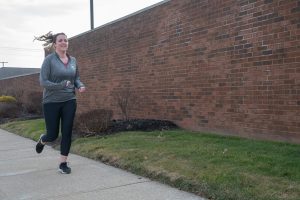
“I’ve started running again, which is something I’m very excited about because I’ve always been a runner,” Audra said. “I also want to raise awareness and be a motivational speaker for people who are going through ulcerative colitis, or any kind of injury. Ulcerative colitis is a common condition, but it’s not talked about enough for awareness.”
Dr. Dagg-Murry said he credits Audra for the strength and determination she showed in what has been a long and difficult process toward healing. “We felt like she made good improvement every time we saw her, but it was with a lot of help from her husband and family, as well as her willingness to trust us to guide her to recovery,” he said.
